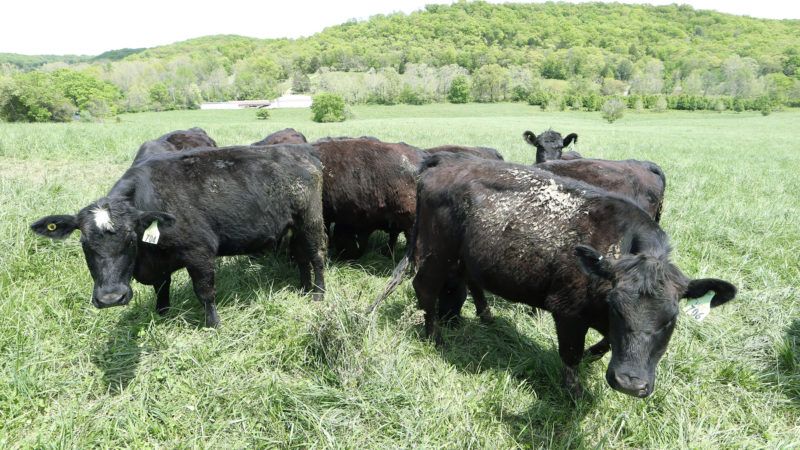To Stanch COVID-19 Meat Crisis, Let Small Farmers Sell Meat to Local Grocers
The ability of Americans to buy meat in grocery stores is at risk due to serious supply-chain issues caused by COVID-19.

The ability of Americans to buy meat in grocery stores is at risk due to serious supply-chain issues caused by COVID-19. Though President Donald Trump just issued an executive order last week requiring meat plants to remain open, there are likely too many sick plant workers for the order to prop up the nation's dwindling meat supply.
The nation's small farmers and ranchers stand ready to help address these supply shortages. But unless Congress moves quickly to amend, suspend, or repeal a burdensome and ineffective federal law, red tape will prevent that meat from ever reaching grocers—or you.
Last month, Smithfield, the nation's largest pork processor, announced it was closing its Sioux Falls, South Dakota, plant "indefinitely" due to a massive outbreak of coronavirus among its thousands of plant workers there. That facility had been processing 4 to 5 percent of the pork Americans consume every day. Since then, competitors in several states have also been forced to shutter or reduce output at facilities in several states.
These massive plants, where livestock are slaughtered and broken down into commercial portions, were created to maximize worker output and efficiency. They were not designed with COVID-19 distancing guidelines in mind. Plant employees often work "shoulder-to-shoulder" and at breakneck speeds—processing more than 1,000 pig carcasses an hour, for example.
Even as large meat processors face peril, many small, local farmers and ranchers—including those who raise high-quality, grassfed cattle—report brisk business in direct-to-consumer (on-farm) sales. While those farmers and ranchers would be happy to sell meat to grocery stores—allowing grocers to keep shelves stocked—a decades-old federal law stands in the way.
That law, the Wholesome Meat Act, which Congress passed in 1967, requires all commercially available beef and pork to be slaughtered and processed either in USDA-inspected facilities or in state facilities that enforce processes "equal to" federal rules. The law, which was intended to boost cooperation between the USDA and state governments, applies both to interstate and intrastate sales. Practically, that means a local rancher who wants to sell 100 pounds of ground beef to a local food co-op must follow the same rules as a giant producer that slaughters tens of thousands of hogs or head of cattle each day and then ships their meat to states across the country. It also means that local rancher who wants to sell meat through commercial channels often must bear the expense of sending her livestock hundreds of miles away—even out of state—to be slaughtered.
With regulatory and cost burdens so high, many farmers and ranchers instead choose to utilize much smaller, local "custom" slaughter facilities and abattoirs outside the USDA inspection regime. Those that do so may only sell an interest in a live animal, which forecloses on the option to sell much smaller portions—such as steaks—to grocers and others.
The Wholesome Meat Act and the 1906 law it amended—the Federal Meat Inspection Act—have been blamed for food-safety issues and massive consolidation in the industry, with Smithfield, Cargill, JBS, and Tyson now controlling most of the nation's meat supply; large producers have cornered more than 80 percent of the nation's beef market and more than 70 percent of the pork market.
That enormous meat supply is now at risk. But a fix is at hand—if Washington acts fast.
As we see it, this is one problem—that meat processed in custom slaughterhouses cannot be sold in intrastate commerce—with three distinct solutions. First, Congress could move immediately to suspend, amend, or repeal portions of the Wholesome Meat Act to allow intrastate commercial sales of meat processed in custom slaughter facilities and abattoirs according to the laws of each respective state. Second, Congress could finally pass the PRIME Act, a bipartisan bill that would have a similar impact. Third, the USDA may be able to suspend enforcement temporarily of the Wholesome Meat Act's provisions pertaining to the mandatory inspection of intrastate meat processing and sales. Other agencies have suspended enforcing rules due to COVID-19. For example, in March, the EPA announced it would suspend enforcement of some pollution regulations due to the pandemic. (Suspending enforcement of rules doesn't require a pandemic. Years earlier, the Obama administration also suspended enforcement of selective rules.)
Choosing any of these three approaches would allow that local rancher to sell her ranch's ground beef to her local grocer, co-op, or restaurant, along with supplying meat at farmers markets, via online sales, and through other commercial avenues. On the other hand, choosing to maintain the status quo will harm consumers, smaller ranchers, and grocers while further decimating the nation's meat supply.
The choice is clear. The integrity of our food supply demands quick action.


Show Comments (65)